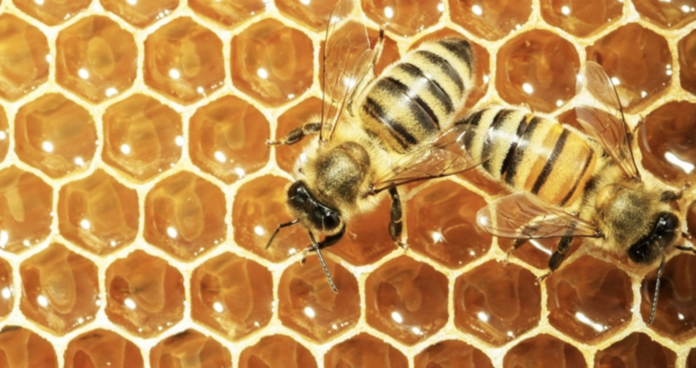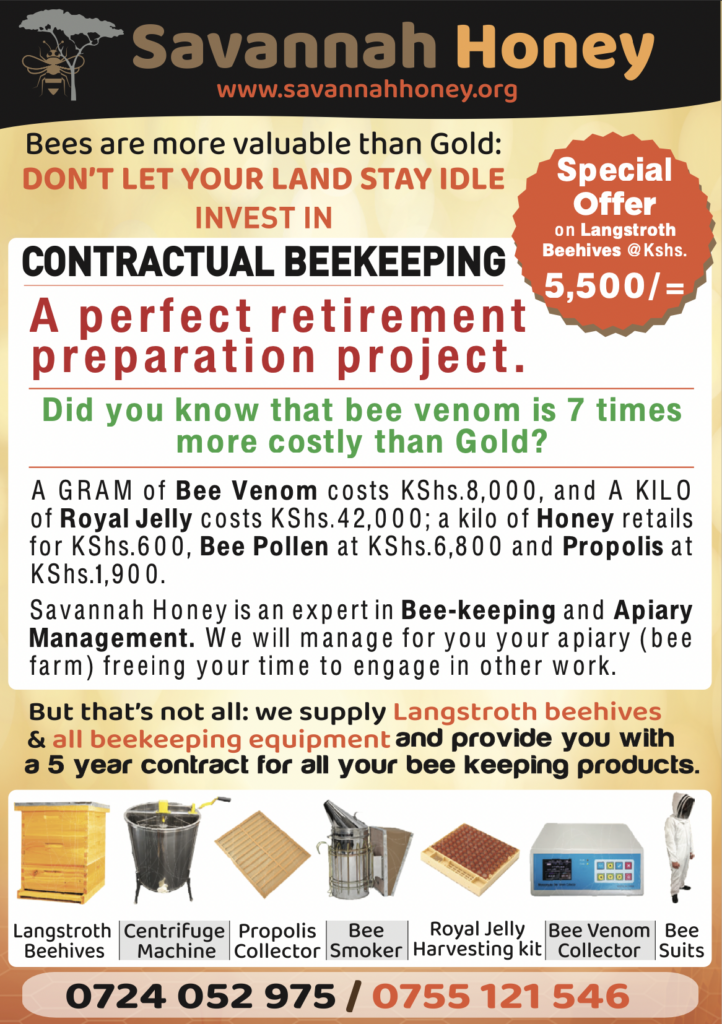Don’t let your land stay idle; invest in Contractual beekeeping.
Propolis or bee glue is a resinous mixture that honey bees produce by mixing saliva and beeswax with exudate gathered from tree buds, sap flows, or other botanical sources. It is used as a sealant for unwanted open spaces in the beehive.
Propolis is used for small gaps (approximately 6 millimeters (1⁄4 in) or less), while gaps larger than the bee space(about 9 millimeters (3⁄8 in)) are usually filled with burr comb. Its color varies depending on its botanical source, with dark brown as the most common. Propolis is sticky at and above 20 °C (68 °F), while it becomes hard and brittle at lower temperatures.
Profitable Beekeeping in Kenya: 21 must-have equipment
When foraging, worker bees primarily harvest pollen and nectar while collecting water and plant resin necessary for propolis production. The chemical composition and nature of Propolis depend on environmental conditions and harvested resources.
A Propolis trap
The demand for Propolis in Kenya has skyrocketed, with very few people engaged in its production, mainly because of a lack of information.
Propolis is a high-income earner that, if exploited, can triple a beekeeper’s income.
“Many people think of bees only in terms of honey. While honey itself is great for wealth, health and job creation, it is of the lowest value compared to the other bee products,”
Kyalo Mutua Maveke CEO Savannah Honey – a leading company promoting Honey, Propolis, Royal Jelly, and Bee venom production in Africa.
Propolis is a sticky substance collected by bees from buds or tree bark.
Bees use the material to reduce the hive entrance size, fill cracks, polish the hive’s interior, strengthen comb attachment, kill intruders by covering them, and as barriers against ants (nest defense).
Propolis is used in human medicine and for veterinary purposes.
Currently, several pharmaceutical companies across the world use Propolis in the production of drugs. Several other companies use Propolis to manufacture medicinal soaps because its antibiotic properties inhibit the growth of microorganisms.
It is also used for making adhesives, e.g., glue, wood pastes for sealing leaking roofs and cracks on wooden furniture. When chewed, it heals backaches.
Commercial propolis harvesting involves using the propolis trap, a plastic mesh sheet used by the bees to build the Propolis.
We help farmers start commercial beekeeping, buy their honey
Savannah Honey is currently recruiting over 1,000 clients for producing honey and Propolis on a five-year contract. Under this program;
- Savannah Honey supplies 20 and above specialized Langstroth hives together with the Propolis Collectors to the client (for commercial purposes, we advise clients to start with 20 hives or more, but clients can also begin with a few and increase the number with time).
- Savannah Honey undertakes the delivery and installation of the hives.
- Savannah Honey manages the apiary (provides technical support to ensure maximum colonization and production). Savannah Honey has provided harvesting and marketing services for five years.
If the client gets a buyer with a better offer, they can sell to them but retain at least 20% for Savannah Honey.
Expenditure for the first year
| Equipment | Cost | Quantity | Total (KSHS) |
| LANGSTROTH HIVES | 5,500@ | 20 | 110,000.00 |
| PROPOLIS TRAP | 2,600@ | 20 | 52,000.00 |
| TOTAL | 162,000.00 |
Income
| Honey | ||||
| Kgs/harvest | NO OF HIVES | NO. OF HARVESTS/YR | PRICE PER KG | TOTAL(kshs) |
| 10 | 20 | 4 | 500.00 | 400,000.00 |
| PROPOLIS | ||||
| Kgs /harvest | NO OF HIVES | NO. OF HARVESTS/YR | PRICE PER KG | TOTAL(Kkshs) |
| 2 | 20 | 20 | 1,900.00 | 1,520,000 |
You can contact savannah honey on;
Telephone: +254 724 052 975
Email: [email protected]
Website: savannahhoney.org










